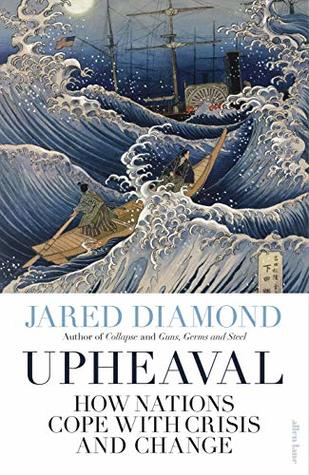More on this book
Community
Kindle Notes & Highlights
Successful coping with either external or internal pressures requires selective change. That’s as true of nations as of individuals. The key word here is “selective.” It’s neither possible nor desirable for individuals or nations to change completely, and to discard everything of their former identities. The challenge, for nations as for individuals in crisis, is to figure out which parts of their identities are already functioning well and don’t need changing, and which parts are no longer working and do need changing.
How do we define a “crisis”? A convenient starting point is the derivation of the English word “crisis” from the Greek noun “krisis” and verb “krino,” which have several related meanings: “to separate,” “to decide,” “to draw a distinction,” and “turning point.” Hence one can think of a crisis as a moment of truth: a turning point, when conditions before and after that “moment” are “much more” different from one another than before and after “most” other moments.
But most individual as well as national crises are the culmination of evolutionary changes extending over many years:
The “crisis” is a sudden realization of, or a sudden acting on, pressures that have been building up for a long time.
But, shared among all of those types of crisis, whatever their cause, is the sense that something important about one’s current approach to life isn’t working, and that one has to find a new approach.
In the best cases, though, the client does discover a new and better way of coping, and emerges from the crisis stronger than before. That outcome is reflected in the Chinese written character translated as “crisis,” which is pronounced “wei-ji” and consists of two characters: the Chinese character “wei,” meaning “danger,” plus the Chinese character “ji,” meaning “crucial occasion, critical point, opportunity.” The German philosopher Friedrich Nietzsche expressed a similar idea by his quip “What doesn’t kill us makes us stronger.” Winston Churchill’s corresponding quip was “Never let a good
...more
Within about six weeks, either we start to explore a new way of coping that will ultimately prove successful, or we embark on a new maladaptive way of coping, or we revert by default to our old maladaptive ways.
The client thereby embarks on a process of selective change, which is possible, rather than remaining paralyzed by the seeming necessity of total change, which would be impossible.
Ego strength means having a sense of yourself, having a sense of purpose, and accepting yourself for who you are, as a proud independent person not dependent on other people for approval or for your survival. Ego strength includes being able to tolerate strong emotions, to keep focused under stress, to express yourself freely, to perceive reality accurately, and to make sound decisions.
Finally, the Finnish army, like the Israeli army today, was effective far out of proportion to its numbers, because of its informality that emphasized soldiers’ taking initiative and making their own decisions rather than blindly obeying orders.
Americans, more than citizens of other countries, believe that their country is a meritocracy, in which people achieve the rewards that their individual abilities permit them to achieve. This is symbolized by the distinctively American phrase “rags to riches”: we believe that a poor immigrant who arrives in rags can become rich through ability and hard work. Is this central belief of ours true?
Quality of education also varies enormously between private and public schools within the same district, because private schools that charge tuition attract children of wealthy parents, pay teachers better, have smaller classes, and provide a much better education. That’s impossible in Finland, where the national government itself pays the salaries of teachers of private schools as well as the public schools and pays the same salaries to teachers at both types of schools, so Finnish parents (unlike American parents) can’t buy a better education for their children by sending them to private
...more
QUESTION: When will the U.S. take its problems seriously? ANSWER: When powerful rich Americans begin to feel physically unsafe.
“Depend upon it, sir, when a man knows he is to be hanged in a fortnight, it concentrates his mind wonderfully.”


